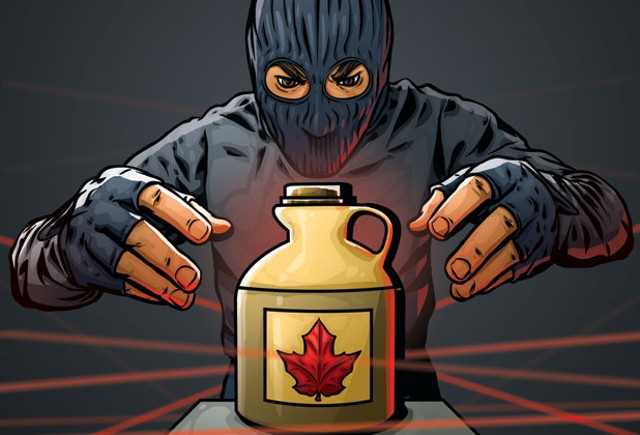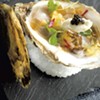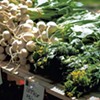Published March 27, 2013 at 5:57 a.m.
It’s dinnertime inside a Québec restaurant about a half hour north of the Vermont border. A waitress asks her customers if they’ve hit any sugar shacks earlier in the day. “It’s so much fun, isn’t it?” she says as she sets down plates of maple-marinated flank steak and maple-glazed Lac Brome duck.
In Québec, which produces more maple syrup than anywhere else in the world, sugaring season can be all consuming. Every March here at Le Relais, overlooking Knowlton’s sleepy crossroads, the chef puts together an entire savory course of maple-tinged dishes, from maple-infused split-pea soup to mussels steamed in a maple-chipotle broth — all using syrup from “a nearby bush,” as the server explains.
Here, the sap’s path from producer to consumer seems straightforward and transparent. Yet in the broader market, as maple’s value soars, tracing its provenance has become surprisingly problematic. A gallon now sells for about $40, nearly double the price three decades ago, and with that mark-up has come a world of trouble. In 2012, a handful of Vermont producers had barrels of syrup snatched from their farms; last summer, $20 million worth of syrup was stolen from Québec’s strategic syrup reserve. That event was to maple producers what the 1990 Isabella Stewart Gardner Museum theft was to the art world.
So far, 23 people have been arrested and more than a dozen have landed in jail for what has been dubbed the Great Canadian Maple Syrup Heist. Officials in Canada and the U.S. are still tracking syrup and untangling the details. Why is the Department of Homeland Security involved? Because at least 12 tankers of the stolen syrup were driven over the border and delivered to St. Johnsbury’s Maple Grove Farms, which is now embroiled in the investigation.
It may surprise some Vermonters that a huge volume of maple syrup crosses our border, but this is increasingly common. “So much of the maple-processing infrastructure is in Vermont, so it’s not uncommon [for producers] to buy syrup from Québec or Maine or New Hampshire,” says Matthew Gordon, executive director of the Vermont Maple Sugar Makers Association. “Their only reason for buying from the outside is that there’s such a demand that we can’t fill.”
Even with more than three million taps, vacuum systems and a pristine reputation, Vermont sugar makers can’t sate the needs of the largest Vermont distributors — and consumers elsewhere don’t seem to mind. Some state producers simply put the words Pure New England Maple Syrup on their bottles, skirting the authenticity issue. On its bottles, Maple Grove Farms assures customers that “This syrup was made entirely from the sap of a sugar maple tree.”
Henry Marckres, the consumer-protection section chief at Vermont’s Agency of Agriculture — and its unofficial “maple guy” — says Vermont’s labeling laws are clear on how to handle syrup that wasn’t generated solely in the state. “There’s a lot of syrup being packed in Vermont that isn’t made in Vermont,” he notes, “as we have quite a few of the major packers.”
Founded in 1915, Maple Grove Farms has grown from what its website calls its “sweet beginnings” as a family farm to the largest distributor of maple products in the United States. Though the company didn’t respond to phone calls, its representatives have admitted in Canadian court documents that it purchased the stolen syrup from Richard Vallières, a Québec resident who has been fingered as the heist’s ringleader. (He’s now in jail.) In a statement given to St. Johnsbury’s Caledonian-Record, a Maple Grove Farms spokesman said, “Maple Grove Farms purchased the maple syrup in good faith with no reason to believe that it was coming from Québec or that it may have been stolen.”
The theft cemented some producers’ hunches that the black market for maple is a real thing and that it messes with prices.
“It proved my suspicions,” says David Marvin of Butternut Mountain Farm in Morrisville, who, with his daughter, Emma, has long theorized that “a significant amount of syrup was moving outside of the system.”
The “system” Marvin refers to is based on prices set by the Federation of Québec Maple Syrup Producers, a private but legal cartel formed in 1989 to regulate and promote Québec maple. The federation reigns, in part, by maintaining the strategic reserve in a string of warehouses throughout the province. The heist occured at one in Saint-Louis-de-Blandford, about two hours northeast of Montréal.
Butternut is one of the biggest maple producers and distributors in the state, though, like Maple Grove, it started humbly. Marvin learned sugaring from his father; after attending forestry school, he returned to the farm to “help grow the market for our products.” The family had 4000 taps in South Burlington, and Marvin toted syrup to the Burlington Farmers Market each week. A few decades later, the company runs 16,000 taps, bottles syrup for other producers, makes maple cream and maple candy, and has the equipment to produce granulated maple sugar for food manufacturers all over the country.
That growth brought with it the need for more syrup — a lot more syrup. “Our mission is to be a profitable, diversified maple-syrup supplier, and diversification is a powerful word,” Marvin says. “We want to be diversified on the customer side, as well as on the supplier side, so we have suppliers in western New York, in Maine, in Québec and in Vermont. Eighty percent [are from] Vermont,” he notes.
That diversification can help the company weather bad years — such as 2012, an awful season by all accounts. Even then, with 30 percent less syrup on the market, Marvin and his daughter noticed that prices sometimes stagnated.
“We try to honor the system by basing our pricing on what we think the world market price is,” Marvin says. “In 2012, we had expected that customers would understand that we had to raise our prices, but we got tremendous pushback.” At the time, Marvin suspected it was because unregulated Canadian syrup was flooding the market. “What the stolen syrup did is prove that there’s a black market,” he says.
Marvin recognizes a few of those who were arrested for the theft. “I know two or three by name, and, in fact, the ringleader has called me every year for the last three years to sell me syrup. I wanted to visit him, but I never did,” he says, sounding slightly relieved. Marvin marvels at the idea that other distributors might use syrup of unknown origins. “Something we try to emphasize to our customers is that there’s a name and a face to every syrup [product] we sell,” he says. “We do mix farms together, but we have complete traceability.”
For years now, the Québec federation’s quotas have irked some Canadian producers, who liken the system to a monopoly and try to circumvent it, thereby risking a fine. What might make Vermont attractive to such producers is “our totally free market,” Gordon points out. While Vermont producers may benefit from federation prices, they can also choose to pay Canadian sellers their asking prices directly, even when these differ from the official federation price.
This is the spine of a black market, and Québec officials have gone as far as setting up phony transactions to catch syrup bootleggers in the act. Yet a fair amount of syrup still makes it over the border, sometimes via producers selling excess syrup to brokers in New Brunswick, which then is exported here.
Anyone who purchases more than 1000 gallons of syrup per year from outside Vermont needs a special license, Marckres says, and must send all purchase and sale records to the state. His department also gets a record of every shipment that comes across the border — hence, he’s been tapped by the federation as it investigates the heist.
“If that syrup has been inspected, the paperwork basically wouldn’t show a red flag,” Marckres says. “There’s no way to catch it unless you’re really looking for it. It’s a little concerning if people were buying syrup from the gentleman in New Brunswick.”
The “gentleman” Marckres is referring to is Etienne St. Pierre, an exporter who has basically thumbed his nose at the federation’s control for years by purchasing surplus syrup from Québec producers and selling it to the United States.
While the scale and bravado of the Québec heist are unprecedented, some Vermonters are already familiar with the unexpected downside of maple’s rising value. Stephen Perley and his family have been sugaring in Enosburg Falls for 65 years. Last year, thieves made off with four barrels of syrup — about $7000 worth — from his sugaring house.
It came as a blow during an already difficult season, and Perley says the syrup, and his barrels, were never found. “That’s more than a few people could eat, that’s for sure,” says Perley, who has a theory about the motive: “I figure [the thieves] had a partner who is a sugar maker” and that his syrup got blended in and sold.
The thought that we could be pouring stolen syrup on our pancakes is troublesome enough. But for sugar makers who work hard to ensure transparency, the discovery of “hot” Québec syrup in Vermont leaves a particularly unsweet taste in the mouth.
“Maple is part of the heart and soul of Vermont agriculture, and a lot of us don’t want to see it diminished,” Marvin says. “We take maple very seriously, and we don’t want to see it messed with.”
This article was titled "Black-Market Maple?" in print.
More By This Author
Speaking of Food,
-

Q&A: Howard Fisher Delivers Meals on Wheels With a Side of Good Cheer
Dec 20, 2023 -

Video: Howard Fisher Delivers Meals on Wheels
Dec 14, 2023 -

Q&A: Alexis Dexter Rescued 57 Shelter Cats During the July Flood
Sep 13, 2023 -

Video: Two Months After the Flood, Alexis Dexter Rebuilds Kitty Korner Café in Barre and Continues to Rescue Cats
Sep 7, 2023 -

Video: Saying Goodbye to Burlington’s Penny Cluse Café
Nov 17, 2022 - More »
Comments
Comments are closed.
From 2014-2020, Seven Days allowed readers to comment on all stories posted on our website. While we've appreciated the suggestions and insights, right now Seven Days is prioritizing our core mission — producing high-quality, responsible local journalism — over moderating online debates between readers.
To criticize, correct or praise our reporting, please send us a letter to the editor or send us a tip. We’ll check it out and report the results.
Online comments may return when we have better tech tools for managing them. Thanks for reading.















































